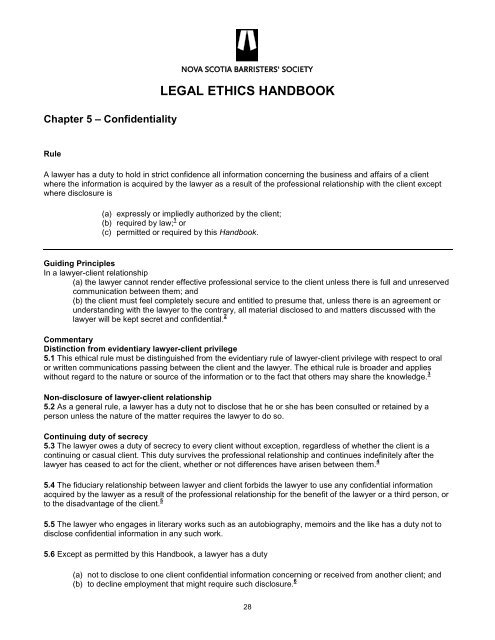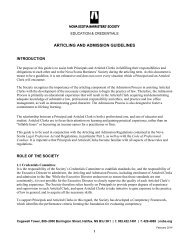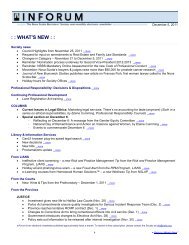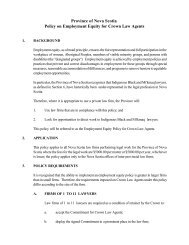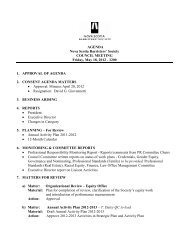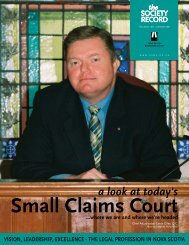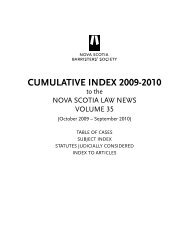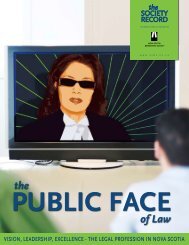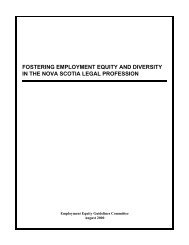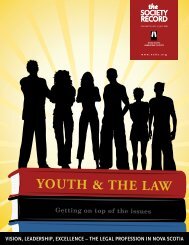legal ethics handbook - Nova Scotia Barristers' Society
legal ethics handbook - Nova Scotia Barristers' Society
legal ethics handbook - Nova Scotia Barristers' Society
You also want an ePaper? Increase the reach of your titles
YUMPU automatically turns print PDFs into web optimized ePapers that Google loves.
Chapter 5 – Confidentiality<br />
Rule<br />
LEGAL ETHICS HANDBOOK<br />
A lawyer has a duty to hold in strict confidence all information concerning the business and affairs of a client<br />
where the information is acquired by the lawyer as a result of the professional relationship with the client except<br />
where disclosure is<br />
(a) expressly or impliedly authorized by the client;<br />
(b) required by law; 1 or<br />
(c) permitted or required by this Handbook.<br />
Guiding Principles<br />
In a lawyer-client relationship<br />
(a) the lawyer cannot render effective professional service to the client unless there is full and unreserved<br />
communication between them; and<br />
(b) the client must feel completely secure and entitled to presume that, unless there is an agreement or<br />
understanding with the lawyer to the contrary, all material disclosed to and matters discussed with the<br />
lawyer will be kept secret and confidential. 2<br />
Commentary<br />
Distinction from evidentiary lawyer-client privilege<br />
5.1 This ethical rule must be distinguished from the evidentiary rule of lawyer-client privilege with respect to oral<br />
or written communications passing between the client and the lawyer. The ethical rule is broader and applies<br />
without regard to the nature or source of the information or to the fact that others may share the knowledge. 3<br />
Non-disclosure of lawyer-client relationship<br />
5.2 As a general rule, a lawyer has a duty not to disclose that he or she has been consulted or retained by a<br />
person unless the nature of the matter requires the lawyer to do so.<br />
Continuing duty of secrecy<br />
5.3 The lawyer owes a duty of secrecy to every client without exception, regardless of whether the client is a<br />
continuing or casual client. This duty survives the professional relationship and continues indefinitely after the<br />
lawyer has ceased to act for the client, whether or not differences have arisen between them. 4<br />
5.4 The fiduciary relationship between lawyer and client forbids the lawyer to use any confidential information<br />
acquired by the lawyer as a result of the professional relationship for the benefit of the lawyer or a third person, or<br />
to the disadvantage of the client. 5<br />
5.5 The lawyer who engages in literary works such as an autobiography, memoirs and the like has a duty not to<br />
disclose confidential information in any such work.<br />
5.6 Except as permitted by this Handbook, a lawyer has a duty<br />
(a) not to disclose to one client confidential information concerning or received from another client; and<br />
(b) to decline employment that might require such disclosure. 6<br />
28


